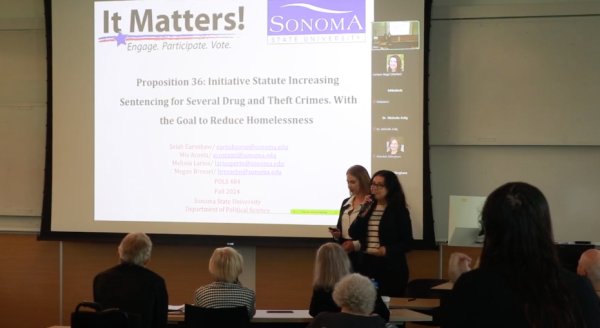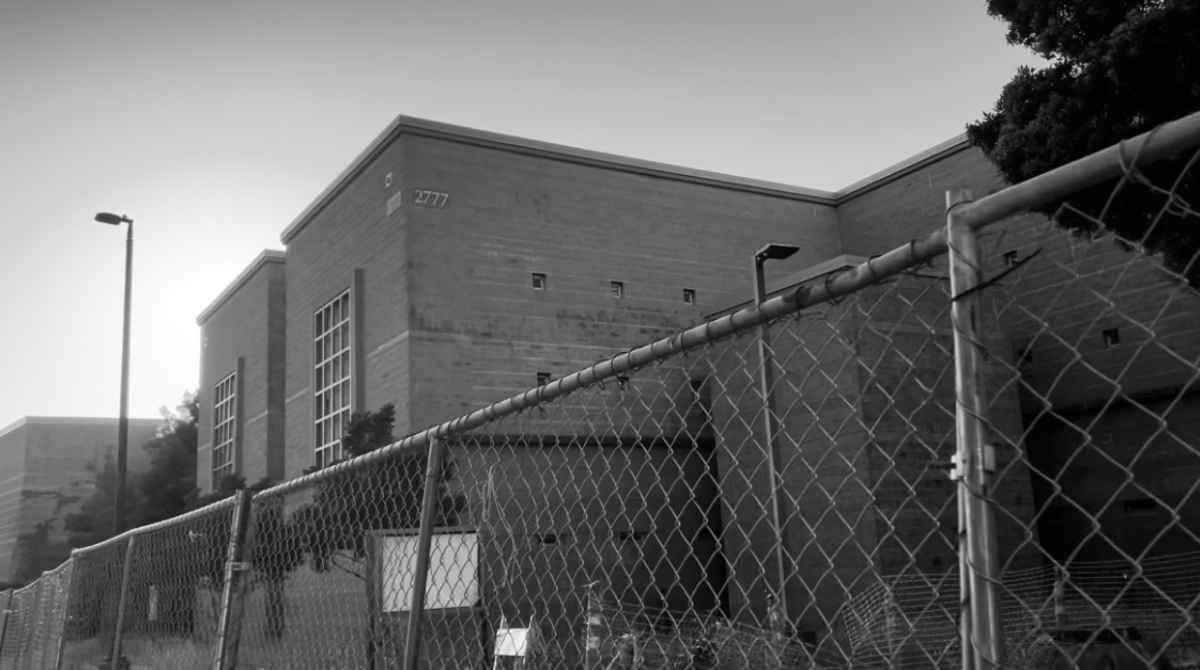We mustn’t forget history when the country, or our state, asks us to vote on legislation that could have devastating effects.
For decades, the U.S. has been witnessing and living through a tragic drug epidemic and a surge in homelessness, alongside significant spending for an ongoing and failing War on Drugs.
Martha Pina, a third-year transfer student at Sonoma State majoring in sociology, and a member of the Rise Above club on campus, said her experience with substance use and the legal system resulted in significant shame.
“My last charge was going to be a felony. It was a third DUI with child endangerment. I ended up losing a career.” Pina said she was a pre-school teacher for 21 years. “That was my rock bottom. But even more than just getting incarcerated, was when CPS came. That was the fear– losing my children. I’ve been six years sober since that happened.”
Pina explained that her charges were dropped to a misdemeanor but ultimately financial strain made it difficult to comply with the legal requirements.
“A lot of it had to do with money. I always worked. I was a single mom. So it was either the light, rent and then can I afford the [DUI] classes? Rent was always first. I couldn’t afford the classes so I wouldn’t go, and I always got in trouble for that.”
Pina got involved with Second Chance at the Santa Rosa Junior College and has since become a peer success coach for other students reintegrating into the education system during or after incarceration.
Ten years ago, Proposition 47 passed in California and went into effect. Its purpose was to shift away from mass incarceration of treatable drug offenses and minor theft, and towards preventative action, funding for programs in K-12 education, as well as treatment for substance use disorder and mental health. At the time, California was struggling with overcrowding in prisons and jails.
As a result, Prop. 47 saved the state $816 million on prison spending and allowed for funding of preventative programs and treatment services, reduced recidivism, and reduced overcrowding in prisons.
Proposition 36 aims to reverse what Proposition 47 achieved, as it seeks a return to harsher penalties including longer prison sentences and felony charges.
‘Yes on 36’ rhetoric aims to pull on the heartstrings by calling attention to ‘saving’ people from drug overdoses and homelessness in our state. It claims that because of Prop. 47, judges have lost the leverage to coerce people to get ‘help,’ who struggle to make this decision for themselves. The initiative blames the law for the rampant suffering in our community.
However, Melissa Larios, a Sonoma State student said at a recent ballot initiative event, “If enacted, Proposition 36 would significantly drive up state prison costs and cut funding from critical services.”

“Incarceration was traumatic,” Suzy Lanter, a third-year transfer student majoring in psychology and art at SSU said.
“I had no access to nutritious food, which is key for someone who has been experiencing drug addiction and homelessness. I received no help or services, and when I was released, I was given the dirty clothes I was arrested in to change into. The lack of wrap-around services… was the biggest blow to my well-being. I walked a few miles to the only place I knew, my dealer’s house and I began to use drugs all over again,” Lanter continued.
Lanter started the Recovery for Seawolves club at SSU to create a safe space for others to process their challenges, whether directly or indirectly related to substance use. She credits her readiness for change and the opportunity to choose and receive treatment as the thing that finally helped save her life, not her interaction with the legal system.
California, among other states, has already suffered a shortage of mental health providers or substance use treatment centers which has caused a delay in people receiving the help they need. This has also added an unnecessary strain on those working in mental and behavioral health services.
“By reducing funding for our social services, which will be even more impacted with the possible passing of Prop. 36, we are setting our vulnerable population up for failure and longer incarceration,” Lanter said.
Furthermore, Prop. 36 and the War on Drugs alike largely place blame on the individual who is struggling with substance abuse and mental health and completely ignore the root cause of suffering— a broken system that in so many ways fosters addictive and harmful behaviors.
“A lot of it is mental health, and there’s no services. We need more prevention, and at a younger age,” Pina explained that growing up Latina, it has been part of the culture to suppress emotions, especially among men. “It isn’t until we get in trouble that we have a space to talk about real issues, our struggles, and our past traumas. Because we’re so busy trying to pay the bills or feed the family.”
A 2024 Supreme Court ruling also deemed it constitutional to ban people experiencing homelessness from sleeping outside– making it okay to arrest and fine people just for needing a place to sleep.
Let’s also not forget that it was Big Pharma and the FDA’s failures, not drug dealers, that contributed greatly to the opioid epidemic and cost millions of lives since 1999, by pushing the prescription opioid OxyContin for pain and lying about its addictive qualities.
“[Incarceration] shouldn’t be the answer. The answer should be treatment, care, and focus on mental health. The War on Drugs hasn’t worked… and we’re still doing that, criminalizing people with addictions. And why are people committing crimes?” Pina said.
Perhaps theft, drug use, and homelessness have persisted, not because we lack harsh punishment, but because the cost of living has soared. At the same time, competition for livable wages has plummeted, and the stress of trying to survive becomes insurmountable.
“I ended up looking for treatment, and that’s what ended up making a difference. I’ve never had the opportunity to take off work to do that, to deal with childhood trauma and abuse in all its forms. And I was 45 [by that time]. Because I left my house at 17, and have always worked and then had three kids and supported them, I never had time to take care of myself and do therapy and take meds,” Pina said.
Pina explained that it was a battle just to get treatment and have insurance cover it. Had she not advocated for that, she feels she would have just gone back to drinking to cope with her mental health.
How does Prop. 36 do anything to improve the harsh conditions of life to prevent the ever-rising influx of tragic human suffering?
The American Civil Liberties Union says Prop. 36 will make California less safe, by cutting hundreds of millions of dollars from successful programs including mental health and substance abuse treatment, trauma recovery services, and programs for K-12 students.
“Many people are concerned over Proposition 36’s impact on racial inequalities, potential risk of reducing state funding, as well as the risk of actually increasing homelessness since there is a deep link with homelessness and incarceration rates,” Larios said.
The War on Drugs was never really about helping the people suffering or improving the quality of life and safety for all human beings. And it seems that neither is Prop. 36.
In 1971, President Nixon declared drug use as America’s “public enemy number one.” We’ve since learned that this declaration was rooted in racist and anti-left sentiment.
So let’s hope we don’t forget as the election approaches, what a former domestic policy chief for the Nixon administration, John Ehrlichman, said in an interview 22 years ago, “The Nixon campaign in 1968, and the Nixon White House after that, had two enemies: the anti-war left and black people,” he said.
“You understand what I’m saying? We knew we couldn’t make it illegal to be either against the war or Black, but by getting the public to associate the hippies with marijuana and Blacks with heroin, and then criminalizing both heavily, we could disrupt those communities,” Ehrlichman said. “We could arrest their leaders, raid their homes, break up their meetings, and vilify them night after night on the evening news. Did we know we were lying about the drugs? Of course, we did.”
What I have learned from my years in recovery from addiction, my work as a substance use counselor, and as a survivor of losing a loved one to an overdose, is that we are human beings too with hopes and dreams like anybody else. For the vast majority of us– we’ve been trying to self-medicate traumas that society often directly or indirectly teaches us to suppress.
While consequences and accountability are important to disrupt harmful behaviors, it should not be the sole answer. People also need safe spaces to feel accepted, and incarceration often reinforces a feeling of being rejected.
“We need to focus on the systemic issues that are keeping these people in a life of crime and drug use,” Lanter said.
“It is much harder as an institutionalized person to integrate back into the workforce, and we are doing a disservice to folks by investing in their incarceration rather than investing in their potential,” Lanter continued.
Our government has tried criminalizing addiction for decades, and this approach hasn’t curbed the death toll or the suffering. Therefore, Proposition 36 is not the solution.





































